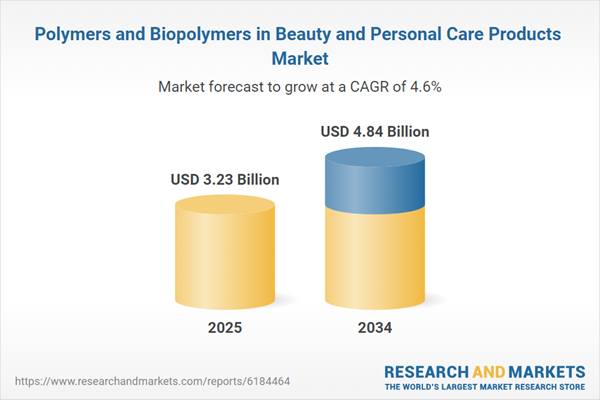Polymers and Biopolymers In Beauty and Personal Care Products Market
The market for polymers and biopolymers in beauty and personal care products covers synthetic and bio‑based macromolecules used within formulations to deliver functions such as conditioning (hair/skin), styling, film‑formation, rheology modification, encapsulation and delivery. End‑use applications span hair care (shampoos, conditioners, styling gels), skin care (creams, lotions, serums), colour cosmetics (mascaras, foundations, lipsticks), and personal hygiene (deodorants, body washes). Recent trends include a marked shift toward biopolymers (such as guar derivatives, hydrocolloids, bio‑based film‑formers) driven by consumer demand for natural/clean‑label ingredients, and the continued requirement for high‑performance synthetic polymers (PVP, polyquaternium, acrylates) in styling and durability formulations. Key drivers include increasing consumer awareness of product feel and performance (e.g., conditioning, smoothness, hold), stronger demands for sustainability (bio‑based, biodegradable polymers), growth of premium and mass beauty segments - especially in emerging markets, and expanding e‑commerce distribution enabling niche biotech‑based polymer innovations. The competitive landscape features major chemical‑specialty players supplying both synthetic and bio‑based polymer systems, alongside formulators and personal‑care brands integrating these technologies. Additional market dynamics include supply‑chain pressure (raw material volatility, regulation around micro‑plastics and polymer safety), rising formulation complexity (multi‑function, minimal water, high‑efficacy), and regional variation in adoption (emerging‑market hair/skin categories vs mature‑market premium segments). The full report will examine segmentation (by material type, function, end‑use category, region), value‑chain dynamics (raw polymer → speciality grade → formulation → brand), and company benchmarking across the polymer/biopolymer supplier ecosystem.Polymers and Biopolymers In Beauty and Personal Care Products Market Key Insights
- Strong conditioning demand fuels polymer uptake: The hair and skin conditioning function remains dominant for polymer/biopolymer use in beauty formulations, as brands seek to deliver enhanced feel, manageability and aesthetic performance.
- Biopolymer momentum accelerating: Biopolymers, derived from natural/renewable feedstocks, are gaining favour as consumers and regulators push for ‘clean’, bio based, biodegradable ingredients - creating incremental growth beyond traditional synthetic systems.
- Styling and film forming continue to need high performance synthetics: Despite sustainability pressures, styling gels, flexible hairsprays and long wear cosmetics still rely heavily on synthetic polymers (e.g., PVP, polyquaterniums) that deliver hold, film formation and durability.
- Rheology modification and texture engineering are key value zones: Polymers/biopolymers used to control viscosity, spreadability, sensory feel and stability (e.g., acrylates, carbomers, hydrocolloids) are increasingly critical as brands pursue premium textures and multifunctionality.
- Emerging market expansion offers growth tails: Growth in beauty & personal care consumption in Asia Pacific, Latin America and MEA is driving higher volumes of polymer/biopolymer inclusion - especially in hair care and skin care product segments.
- Sustainability, eco labelling and regulation are shaping innovation: Pressure on micro plastic usage, restriction on certain synthetic polymers, consumer demand for bio based and biodegradable systems are compelling supplier innovation and premiumisation of polymer systems.
- Raw material volatility and supply chain risk impact cost and formulation: Many polymers derive from petrochemical feedstocks; fluctuations in oil and intermediate chemical pricing and regulatory risk add cost and complexity to suppliers and formulation houses.
- Customization and multifunctionality are differentiators: Suppliers that offer tailored polymer systems (e.g., allergen free, natural derived, dual function conditioning/styling) deliver value to beauty formulators seeking differentiation - a strategic vantage.
- Premiumisation trend supports higher margin polymer systems: As consumers pay more for premium feel, natural origin claims and boutique brands, polymer/biopolymer suppliers supporting premium channels benefit from above average growth compared to commodity grades.
- Technology convergence across categories: The line between hair care, skin care and styling is blurring (e.g., hybrid formulations, post wash styling, skin as hair treatments) so polymer/biopolymer systems must adapt across multiple end use platforms - enabling cross category opportunities.
Polymers and Biopolymers In Beauty and Personal Care Products Market Reginal Analysis
North America
In North America, the market is characterised by high consumer expectations, strong brand‑innovation cycles, and regulatory scrutiny on ingredient safety and sustainability. Suppliers of polymers and biopolymers are increasingly focusing on clean‑label claims, biodegradable systems and personal‑care performance enhancement. Growth is steady, but premium and niche variants (bio‑based, natural certified) are growing fastest.Europe
Europe presents a mature but evolving market where regulatory frameworks (e.g., REACH, micro‑plastic regulations) and sustainability demands strongly influence polymer/biopolymer adoption in beauty and personal‑care. Brands are emphasising eco‑credentials, minimal synthetic burden, and premium sensory performance - creating strong demand for advanced biopolymer systems and differentiated polymer formulations.Asia‑Pacific
Asia‑Pacific is the strongest growth frontier for polymers & biopolymers in beauty/personal‑care. Rising disposable incomes, expansion of middle‑class, growing beauty consciousness and local manufacturing in countries like China, India and Southeast Asia are supporting substantial uptake. Moreover, local raw‑material availability for biopolymer feedstocks provides cost advantages. The region offers high volume potential for both synthetic and bio‑based polymer systems.Middle East & Africa
In MEA, growth is moderate but increasing. Demand is driven by premium urban consumers, rising e‑commerce penetration and beauty‑care adoption. However, cost‑sensitivity, supply‑chain import‑dependence and limited local polymer/biopolymer manufacturing restrict rapid expansion. Suppliers focused on premium bio‑based claims and niche luxury positioning may find opportunity.South & Central America
Latin America offers emerging opportunities for polymers and biopolymers in beauty/personal‑care as retail penetration of premium brands rises and local formulation adapts to regional needs (humidity, hair types, skin types). However, economic volatility, currency risk and local manufacturing constraints temper growth speed; cost‑efficient polymer systems and scalable biopolymer sourcing will be critical for success.Polymers and Biopolymers In Beauty and Personal Care Products Market Segmentation
By Function
- Conditioning (Polyquaternium-10
- Guar Derivatives
- PVP
- PVP/VA
By Styling
- Carbomer
- Polyacrylate Derivatives
- Acrylates/C10-30 Alkyl Acrylate Cross-polymer
By Rheology Modifying
- Synthetic Polymers
- Biopolymers
Key Market players
BASF, Dow, Evonik Industries, Ashland, Clariant, Croda International, Solvay, Lubrizol, Arkema, Wacker Chemie, DSM-Firmenich, Nouryon, Seppic (Air Liquide), Roquette, Givaudan Active BeautyPolymers and Biopolymers In Beauty and Personal Care Products Market Analytics
The report employs rigorous tools, including Porter’s Five Forces, value chain mapping, and scenario-based modelling, to assess supply-demand dynamics. Cross-sector influences from parent, derived, and substitute markets are evaluated to identify risks and opportunities. Trade and pricing analytics provide an up-to-date view of international flows, including leading exporters, importers, and regional price trends.Macroeconomic indicators, policy frameworks such as carbon pricing and energy security strategies, and evolving consumer behaviour are considered in forecasting scenarios. Recent deal flows, partnerships, and technology innovations are incorporated to assess their impact on future market performance.
Polymers and Biopolymers In Beauty and Personal Care Products Market Competitive Intelligence
The competitive landscape is mapped through proprietary frameworks, profiling leading companies with details on business models, product portfolios, financial performance, and strategic initiatives. Key developments such as mergers & acquisitions, technology collaborations, investment inflows, and regional expansions are analyzed for their competitive impact. The report also identifies emerging players and innovative startups contributing to market disruption.Regional insights highlight the most promising investment destinations, regulatory landscapes, and evolving partnerships across energy and industrial corridors.
Countries Covered
- North America - Polymers and Biopolymers In Beauty and Personal Care Products market data and outlook to 2034
- United States
- Canada
- Mexico
- Europe - Polymers and Biopolymers In Beauty and Personal Care Products market data and outlook to 2034
- Germany
- United Kingdom
- France
- Italy
- Spain
- BeNeLux
- Russia
- Sweden
- Asia-Pacific - Polymers and Biopolymers In Beauty and Personal Care Products market data and outlook to 2034
- China
- Japan
- India
- South Korea
- Australia
- Indonesia
- Malaysia
- Vietnam
- Middle East and Africa - Polymers and Biopolymers In Beauty and Personal Care Products market data and outlook to 2034
- Saudi Arabia
- South Africa
- Iran
- UAE
- Egypt
- South and Central America - Polymers and Biopolymers In Beauty and Personal Care Products market data and outlook to 2034
- Brazil
- Argentina
- Chile
- Peru
Research Methodology
This study combines primary inputs from industry experts across the Polymers and Biopolymers In Beauty and Personal Care Products value chain with secondary data from associations, government publications, trade databases, and company disclosures. Proprietary modeling techniques, including data triangulation, statistical correlation, and scenario planning, are applied to deliver reliable market sizing and forecasting.Key Questions Addressed
- What is the current and forecast market size of the Polymers and Biopolymers In Beauty and Personal Care Products industry at global, regional, and country levels?
- Which types, applications, and technologies present the highest growth potential?
- How are supply chains adapting to geopolitical and economic shocks?
- What role do policy frameworks, trade flows, and sustainability targets play in shaping demand?
- Who are the leading players, and how are their strategies evolving in the face of global uncertainty?
- Which regional “hotspots” and customer segments will outpace the market, and what go-to-market and partnership models best support entry and expansion?
- Where are the most investable opportunities - across technology roadmaps, sustainability-linked innovation, and M&A - and what is the best segment to invest over the next 3-5 years?
Your Key Takeaways from the Polymers and Biopolymers In Beauty and Personal Care Products Market Report
- Global Polymers and Biopolymers In Beauty and Personal Care Products market size and growth projections (CAGR), 2024-2034
- Impact of Russia-Ukraine, Israel-Palestine, and Hamas conflicts on Polymers and Biopolymers In Beauty and Personal Care Products trade, costs, and supply chains
- Polymers and Biopolymers In Beauty and Personal Care Products market size, share, and outlook across 5 regions and 27 countries, 2023-2034
- Polymers and Biopolymers In Beauty and Personal Care Products market size, CAGR, and market share of key products, applications, and end-user verticals, 2023-2034
- Short- and long-term Polymers and Biopolymers In Beauty and Personal Care Products market trends, drivers, restraints, and opportunities
- Porter’s Five Forces analysis, technological developments, and Polymers and Biopolymers In Beauty and Personal Care Products supply chain analysis
- Polymers and Biopolymers In Beauty and Personal Care Products trade analysis, Polymers and Biopolymers In Beauty and Personal Care Products market price analysis, and Polymers and Biopolymers In Beauty and Personal Care Products supply/demand dynamics
- Profiles of 5 leading companies - overview, key strategies, financials, and products
- Latest Polymers and Biopolymers In Beauty and Personal Care Products market news and developments
Additional Support
With the purchase of this report, you will receive:- An updated PDF report and an MS Excel data workbook containing all market tables and figures for easy analysis.
- 7-day post-sale analyst support for clarifications and in-scope supplementary data, ensuring the deliverable aligns precisely with your requirements.
- Complimentary report update to incorporate the latest available data and the impact of recent market developments.
This product will be delivered within 1-3 business days.
Table of Contents
Companies Mentioned
- BASF
- Dow
- Evonik Industries
- Ashland
- Clariant
- Croda International
- Solvay
- Lubrizol
- Arkema
- Wacker Chemie
- DSM-Firmenich
- Nouryon
- Seppic (Air Liquide)
- Roquette
- Givaudan Active Beauty
Table Information
| Report Attribute | Details |
|---|---|
| No. of Pages | 160 |
| Published | November 2025 |
| Forecast Period | 2025 - 2034 |
| Estimated Market Value ( USD | $ 3.23 Billion |
| Forecasted Market Value ( USD | $ 4.84 Billion |
| Compound Annual Growth Rate | 4.6% |
| Regions Covered | Global |
| No. of Companies Mentioned | 15 |









